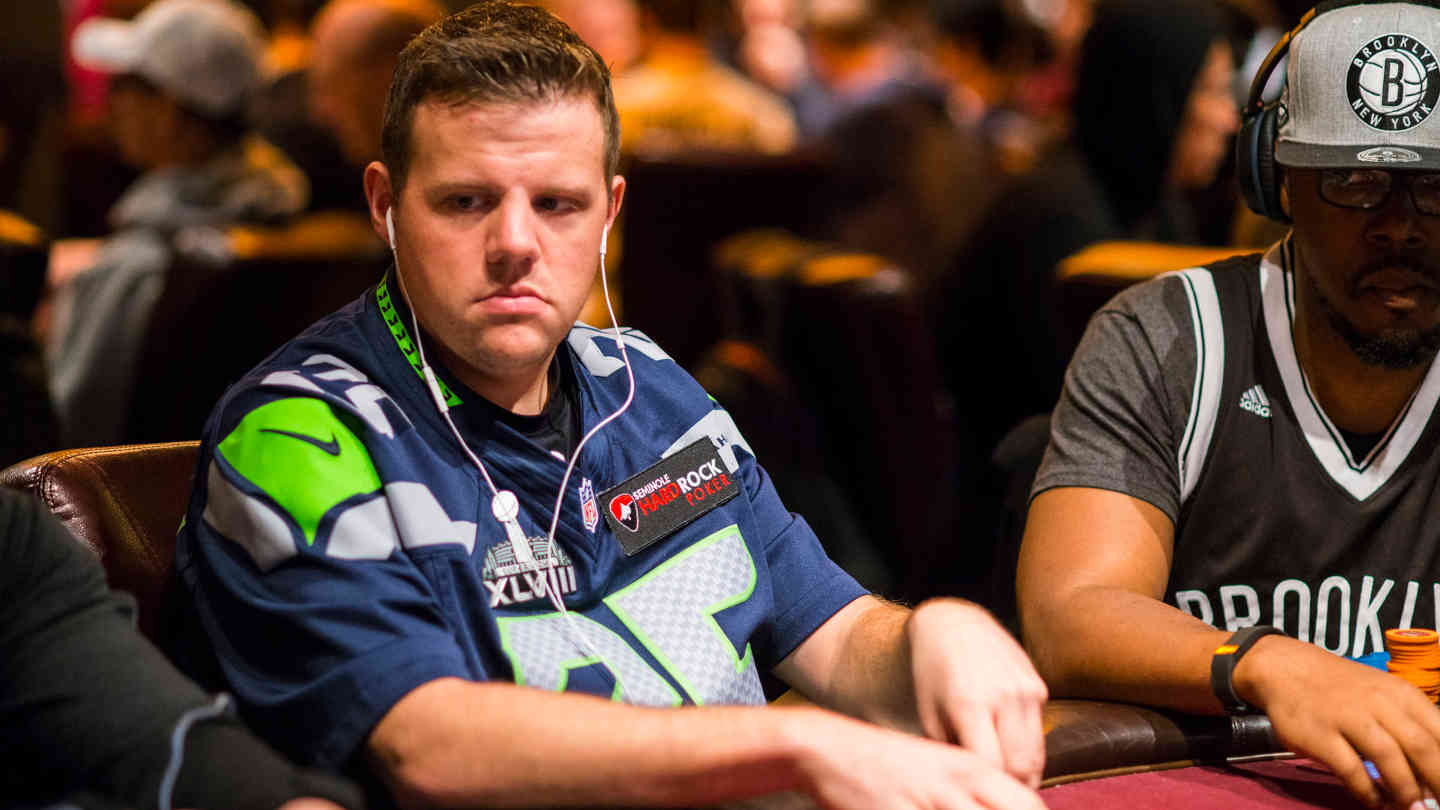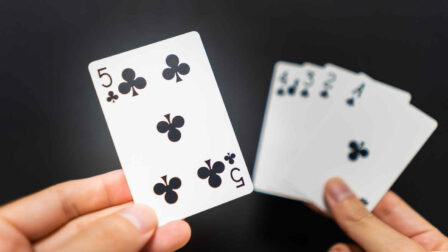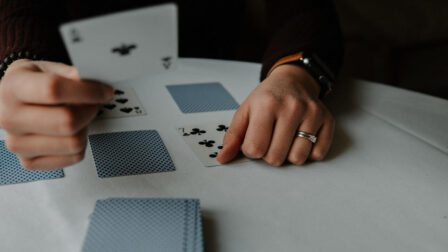Rummy Rules – Learn How To Play And Win In This Card Game
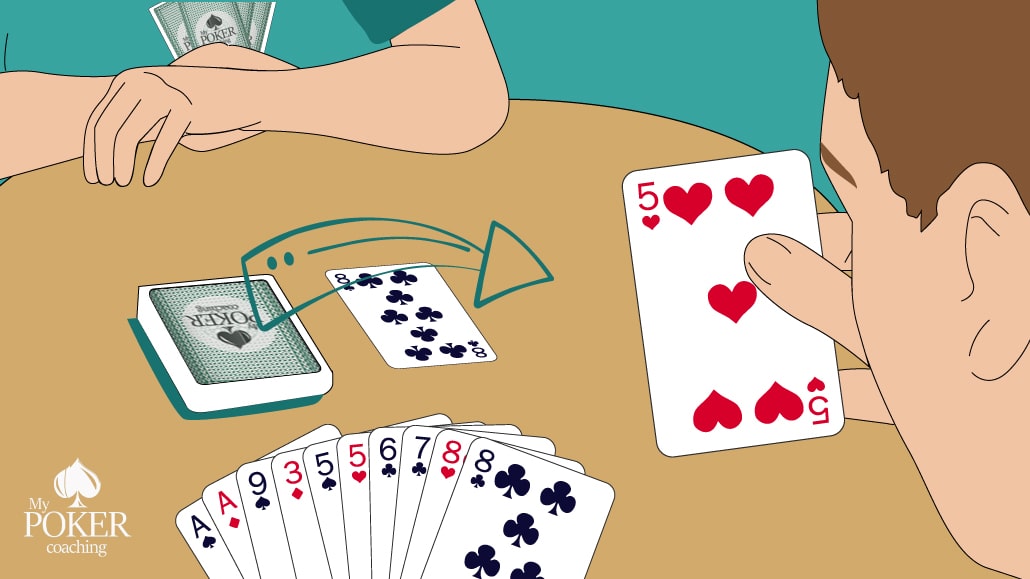
11 minutes
Last Updated: March 19, 2024
Rummy is one of the most popular card games worldwide. Although it can be played for money, rummy is frequently played just for entertainment between family and friends.
Rummy rules are fairly easy to learn, and the game combines both elements of luck and skill, making it entertaining and somewhat challenging.
In this article, you’ll learn how to play rummy, starting with the basic setup and rummy rules, understanding how to keep score, and wrapping up with some simple strategies to help you become a better player.
It’s important to note that there are many different rummy variations out there, with some slight adjustments. The article will focus on the mainstream version of the rummy card game, and once you learn this, you can easily transition to other variations.
Rummy Card Game Preparation
Before you can learn how to play rummy, you’ll need some basic things to get you started. This particular game isn’t too complicated in terms of logistics as you do not need a special board like in a Cribbage card game, so you’ll only need one or two decks of cards. If you also want to keep score, you’ll also need a pen and paper.
A great thing about rummy is that it is a very social game, as up to eight people can play it.
However, it is usually played by no more than six players, and if there are more than six players, you’ll need to use two decks of cards.
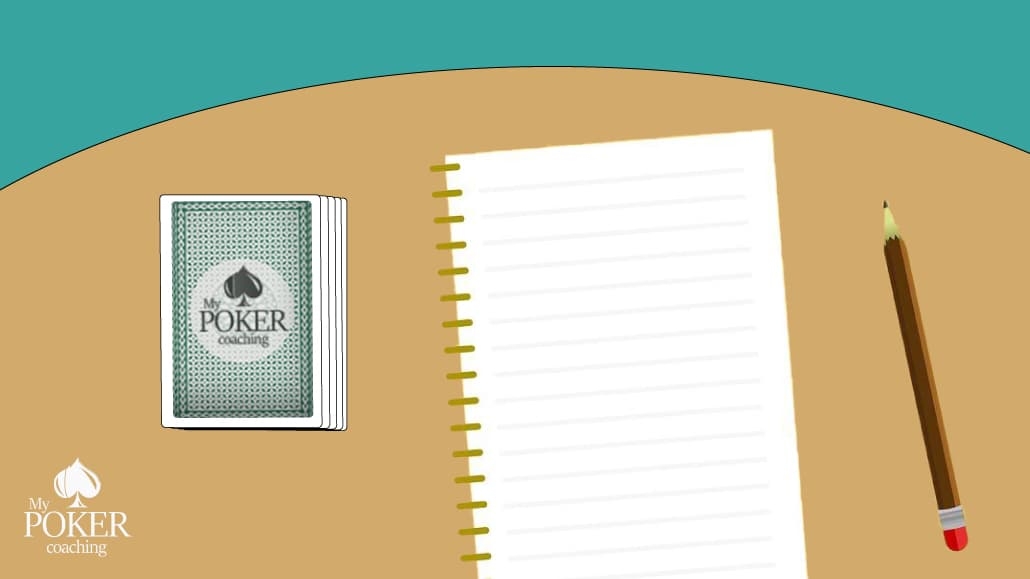
Of course, you can choose two play with two decks, even if there are fewer players.
You’ll need a pen and paper to keep score. This isn’t mandatory as you can just play each game independently, but rummy is much more exciting when the score is tracked.
You’ll find out how to do it a bit later in the text, so keep on reading.
Main Rummy Info:
- This game can be played with 2-8 players
- You will need one card deck if there are up to six players and two decks if here is 7 or 8
- You should get a pen and paper to track score while playing
Rummy Glossary
- Runs – sequences of consecutive cards of the same suite like 8s 9s 10s or 6h 7h 8h 9h
- Sets – three or four cards of the same rank and different suits like 9 9 9 or J J J J
- Joker (wild card) – a card that can be used to substitute any missing card in a run or a sequence
- Discard pile – a pile containing all discarded cards during the game
- Melds – a name for runs and sequences when placed on the table
- Going rummy – laying off all of your cards in one go winning the game
Rummy Rules
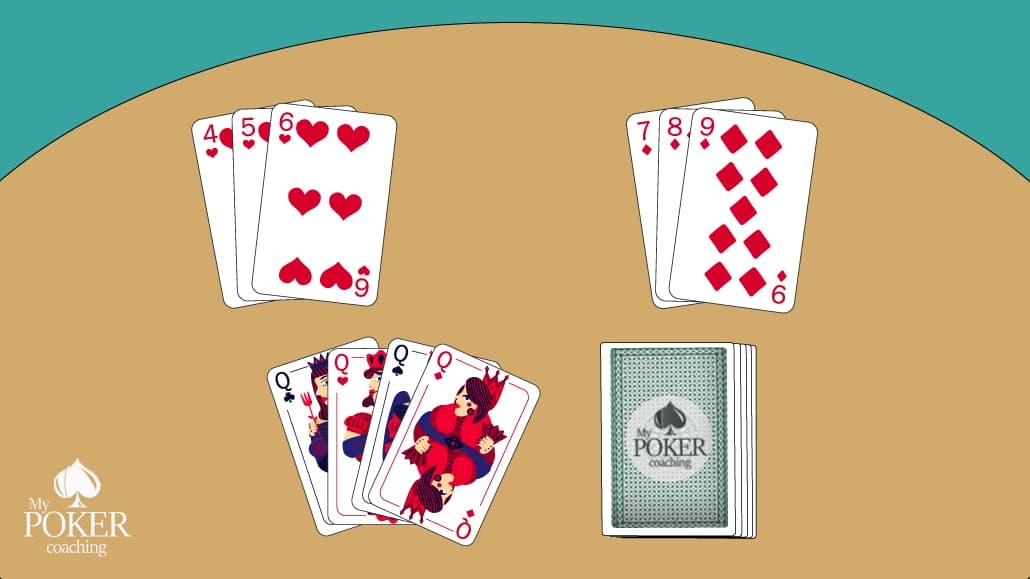
As mentioned, rummy rules aren’t particularly complicated. Once you’ve played a few games, you’ll understand all there is to understand as far as the rules are concerned. There is nothing particularly difficult about playing rummy.
The object of the Game
A rummy game's main goal is to get rid of the cards from your hand, usually referred to as going out.
You can do this all at once or gradually by placing runs and sets onto the table.
- Runs are consecutive sequences of cards of the same suite, containing three or more cards, i.e., 7s, 8s, 9s.
- Sets consist of three or four cards of the same value (rank), i.e., KKKK. When playing with two decks, you can’t use cards of the same suit in one set, i.e., you can’t have two kings of clubs in your set.
The first player to gets rid of all of the cards from their hand by putting down runs and sets, also referred to as melds, wins the round.
Card rankings in rummy for the purposes of making runs are natural. For example, a sequence of 4 5 6 in the same suit is a legitimate run. The same goes for 10 J Q K or 8 9 10.
As for the aces, they can play as low (A, 2, 3) and as high-value cards (Q, K, A).
The Deal
When it comes to dealing cards, there are different rules for rummy variations. Cards are always dealt face down to the players and never revealed to others until they are put down (melded) on the table.
In single deck variations:
- If only two players play, each player gets 10 cards
- When there are 3 or 4 players, each player is dealt 7 cards
- When 5 or 6 players player, each receives 6 or 7 cards
In double-deck variations
- All players receive 13 cards to start the round
The version with two decks and 13 cards is generally more entertaining, and rounds tend to last longer.
On the other hand, single-deck versions are fast-paced and represent a great way to have some fun when you don’t necessarily have a few hours to complete a rummy game.
Rummy Scoring System
Rummy uses a fairly simple system for scoring. When the first player goes out, everybody else will count cards in their hand:
- Face cards have a value of 10.
- Aces are counted as 1.
- All other cards have their face value.
For example, if a player holds a K, 9, 6, 4, and an A in their hand when another player goes out, their total would be 10 + 9 + 6 + 4 + 1 = 30.
You want to have as few points as possible in your hand when a player goes out and ends the playing round.
If a player goes out in a single move, i.e., puts out all of his cards on the table in one go, they complete rummy.
In this case, all points in other players’ hands are doubled.
This is the basic scoring system according to the rules of rummy, but there are many variations as well, where the winning player might also receive negative points for going out, making the win even more valuable.
For example, going out could be valued at -40, and going rummy can be counted as -180.
Before starting the game, players will usually agree on the number of rounds they’ll play. They’ll update the score after each round, and once the game is completed, they’ll add all the numbers and figure out the final score.
The player with the least points is the winner.
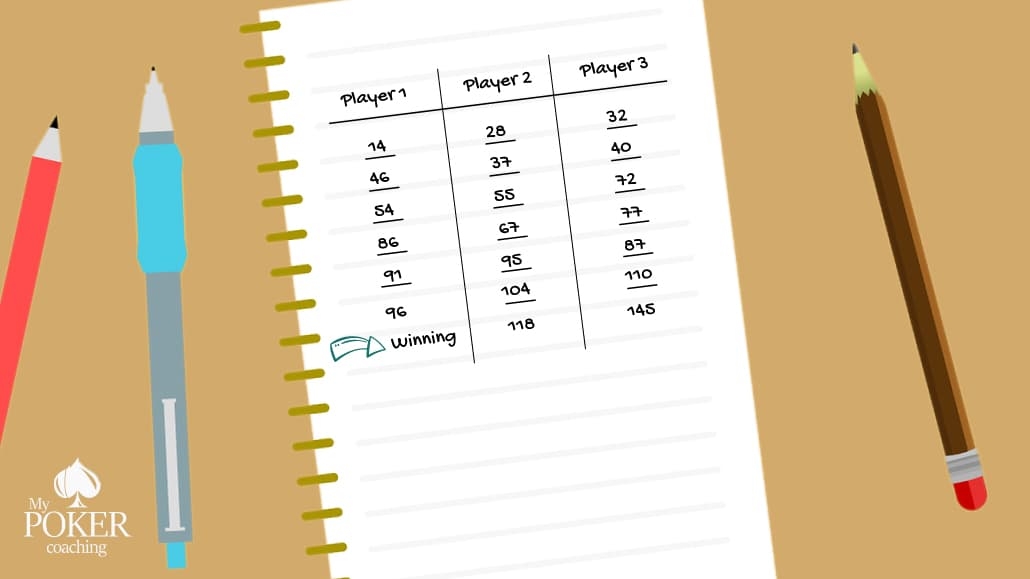
When a rummy card game is played for real money, players will agree beforehand on how much a point is worth and will settle the score at the end.
Here’s an example of a completed game where points are worth $0.10 each.
- Player 1 has 350 points
- Player 2 has 220 points
- Player 3 has only 50 points (he is winning)
In this scenario, both Player 1 and Player 2 will owe money to Player 3. Player 1 needs to pay (350-50)*$0.10 = $30.
Player 2 has to pay (220-50)*0.10= $17. So, the total profit for Player 3 is $47.
Player 1 also needs to pay Player 2. The difference between points is 350-220 = 130, so Player 1 needs to pay an additional $13 to Player 2.
Thus, the final tally is:
- Player 3: +$47
- Player 2: -$4 ($17 – $13)
- Player 1: -$43 ($30 + $13)
It’s quite important to understand how the points’ system works in rummy because it can play an important role in how you go about your strategy in longer games.
As you can see, Player 2 lost the game, but their monetary loss was quite small.
Player 3, on the other hand, lost quite a bit of money even though the difference between him and Player 2 wasn’t as big.
Using Wild Cards (Jokers)
Sometimes, players will also agree to use jokers (wild cards). These can usually replace any card in a set or sequence and are almost always used in games with two decks.
The rule of thumb is to have one joker per player, but this is ultimately down to what players agree on.
How to Play Rummy
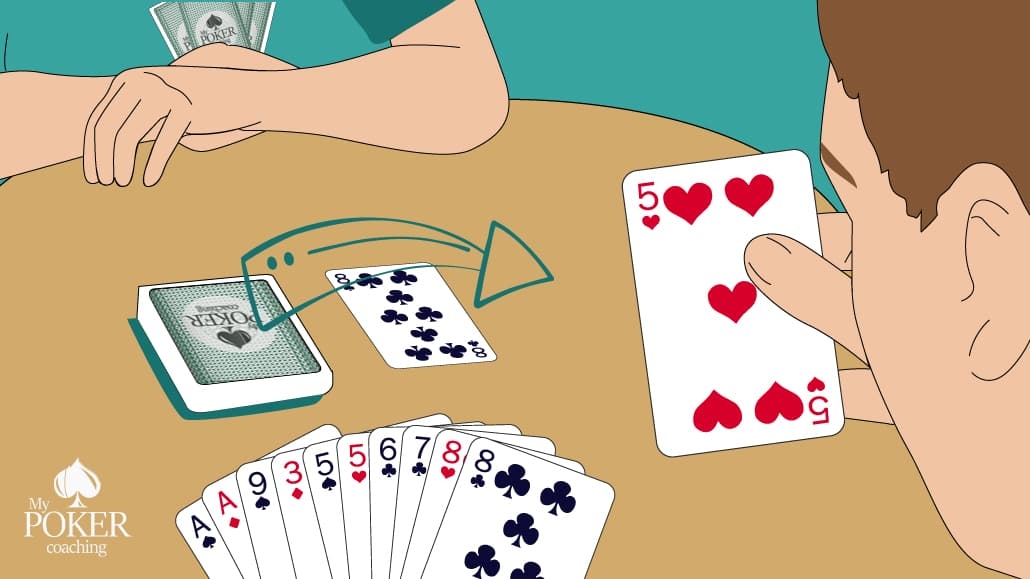
Now that you know what you need in terms of logistics and understand all the important rules and the scorings system, the next question to answer is: how do you play rummy?
Once the deal is completed as described earlier, the play can begin.
The remainder of the cards is placed on the table, face down, and the player to have received the first card on the deal is the first to act.
They’ll reach for the deck, take the card from the top, and check it out without revealing it to anyone else.
If the card helps you, either by filling sets or runs or creating new opportunities for future combinations, you can keep it and discard another card from your hand, face up.
The action continues clockwise, with the next player in line having an option to take the discarded card or the next face-down card from the deck.
They have the same options to keep a new card and discard a different one or discard the card they’ve just pulled.
At any point when it’s their turn to act, players can place completed runs and sets from their hand onto the table.
By doing this, they reduce the number of points in their hand but also give more options to other players.
Once cards are down on the table, other players can use them to go out easier. Namely, when they place their combinations onto the table, they can also get rid of cards from their hand by adding them to the combinations already out there.
For example, Player 1 puts down Kh Kc Kd and 7h 8h 9h. The next player to act puts out his combinations, but they also hold a Ks, 10h, and Jh. They can add all three of these cards to the existing melds as they naturally fit into the combinations.
You can add to all melds in rummy in this way.
Once those cards are on the table, it no longer matters who put them out. You can add to your own melds or those of your opponents.
Once you manage to get rid of all the cards from your hand, i.e., go out, you win.
Another way to win is to go out at once without adding any cards to other melds out there. If all the cards in your hand are a part of sets and runs, you can place them out all at once and win the game.
This is known as going rummy or simply rummy.
A Quick Summary of How To Play Rummy:
- When you get your cards, the remaining undealt cards are set in the middle of the table.
- The action starts with the player who got the first card when dealing and continues clockwise.
- Whenever it is your turn to act, you have to take one card from the deck or you can choose to use a card that was discarded by the player acting before you. You will finish your move by discarding one card from your hand.
- When it’s your turn to act you can discard sets or runs from your hand by placing them on the table. You’ll do this before discarding a card from your hand to the discard pile.
- You can add cards to the melds visible at the table, even if created by another player.
- If you do not have sets, runs, or relevant cards that you could add to existing melds, you have to discard only one card.
- When you finish your move, the other player starts his, and the action goes clockwise.
Useful Rummy Card Game Tips & Tricks
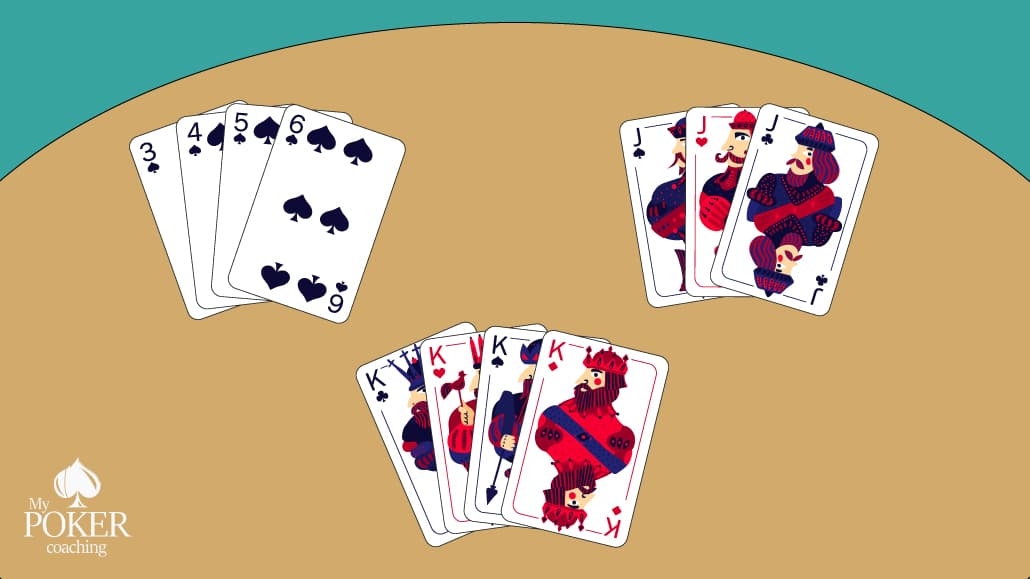
Rummy card game isn’t particularly demanding, and it is mostly about the luck of the draw just like a Go Fish game. If you start with a good hand, i.e., a hand with a few combinations already completed, you’ll usually win.
If you start with a really bad hand, you can’t do much.
However, there are still a few useful tricks that can help you win a bit more often than you should if you only relied on luck.
First of all, it’s really good to pay attention to what cards are being discarded.
This can tell you if a combination you’re hoping to complete is likely to come in or if you should maybe look to give up on it and try a different one.
For example, in a two-deck game, you’re waiting for one of the cards to complete your 6s 7s run. However, you see two 5s and one 8s get thrown away. Now there is just one card that can help you, and you’re not sure if someone is using that card as a part of their combo. So, you might never see it.
In this situation, you should look to switch things up quickly.
The next time you draw a 6 or a 7, keep it and discard the odd card. So, you’ll end up with two sixes and four potential cards to fill your set.
Even if you know one of them is out of play, you still have a couple of more outs than with your previous combination.
Keeping track of what cards the player on your immediate left is throwing away is also important.
This can give you a pretty good idea of what cards are unlikely to help them, and since you’re the one who’ll be discarding cards they can pick up, you can make it more difficult for them to win.
Finally, you need to keep track of the points and always know where you’re at in longer games. As you could see from the earlier example, you want to do your best not to finish the last.
Sometimes, if you see that you can’t win, it’s smart to strategize a bit and ensure the difference between you and the winner is as small as possible.
Summary: Learn Rummy Rules And Enjoy This Card Game
This is pretty much everything you need to know about how to play rummy card game.
This is a fairly simple but very interesting game that can be exciting when played for real money and fun.
Bragging rights are sometimes just as important as money, especially among friends, and playing this game well will give you a lot of those!












